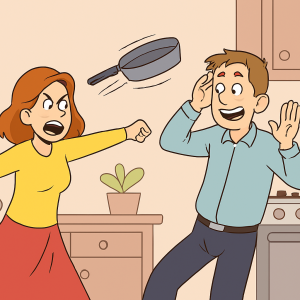

When I was pretty young and struggling in school, I first heard the word 'reaction' during my physics teacher's lecture on the three Newtonian laws of motion. The third law is 'action and reaction are equal and opposite.' The teacher, of course, provided numerous examples to illustrate the law and attempted to convey the theory to my reluctant mind.
Today, after six long decades, when I think of the word 'reaction', something in me tells me that the word is born with us, lives with us and dies with us. Is there any other single word that covers a broader field of life? I doubt it.
I am in for correction. With a word like 'reaction,' we have no power to stop in the middle. We have to see things through to the very end. Moreover, it never works alone but in a chain. Reaction cannot be standardised for, as all of us know, it is bound to vary from one individual to another.
Imagine the first person on Planet Earth. What was their reaction when, upon opening their eyes, they perceived the incredible creation around? "Wow! Who did all this?" The first reaction was followed by a second reaction: "Who am I?" Then the third: "Where am I?" And the next definitely was "What is life?" Once this poser was asked, the search went on endlessly in loops and circles.
Reactions are of all sorts. Chemical, physiological, psychological, biological, political, domestic, social, national and international. A chemical reaction occurs in the kitchen.
We know the reaction of groundwater with the molten rock. My wife had a bad reaction to penicillin. Our reactions get slower as we grow older. When we were tiny tots, a slender needle prick in the hospital made us yell and shed tears. But in old age, we are undaunted even when a frying pan comes flying towards us from our royal kitchens; we develop hides as tough as that of a buffalo.
Can you ever think of having a conversation with your mother, quarrelling over nothing with your wife, or your boss supporting a colleague, a scheming villain, without releasing the mighty spring of reaction? Can you ever think of having a hot lunch without reacting? All actions are bound to have reactions. A yogi too reacts, and at some stage or other, we are terribly caught in its toils. If we cease to respond, then we are dead wood.
Wasn't the French Revolution a reaction against the old order? Was not the first half of the 19th century a period of reaction and repression? All 'isms' too are products of reaction. Theism was a reaction against unbelief. Socialism was a reaction against old capitalism. Communism against Fascism. A wife becomes a nagging woman as a reaction to her bullying husband. A student becomes a scholar in the hands of a teacher worth his salt. Another turns out to be a dullard in the hands of a lethargic one. All are reactions.
The Persian poet Hafiz once sang,
"Oh, beautiful cupbearer!
For that black mole upon your cheek
I would give Samarkand and Bokhrane."
Timur, the Shah, who happened to hear this song, reacted in the way the sovereign should. He called the poet, looked daggers at him, and asked, "How can you ever think of giving away my kingdom to the stupid black mole?"
Hafiz, unperturbed, replied, "Before asking me such a question you should have seen the mole. Then you would know what great importance I have given to your kingdom." That was how two men reacted to the black mole of the cupbearer, who was only a boy.
Reaction has as many types and manifestations as there are individual peculiarities. The very sight of a bowl of noodles would throw a villager, wanting to dine in a three-star restaurant in town, out of gear. His companion would fall sick if his eyes happened to meet the eyes of a lobster on a plate. The smell of sausage would spell an acute spasm of coughing. I felt hilarity when someone ordered a beer mixed with soda and ice at a restaurant bar.
A comely woman may make a hue and cry over lizards and cockroaches, though she can easily stare at her handlebar moustache husband full and round. One man can't stand the smell of tobacco and another woman the male odour. One may love the smell emanating from a petrol bunk, and his wife may move away to stand at a distance, all the time holding her nose and breathing through her mouth. What sort of reactions are they if not constitutional aversion?